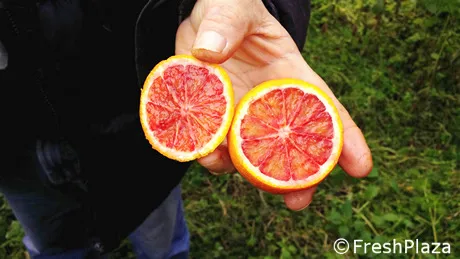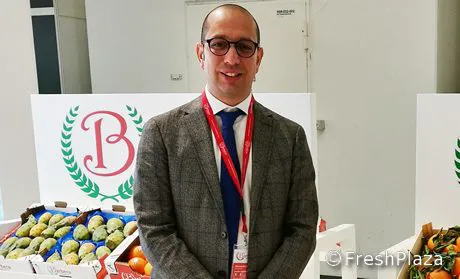We talked to Yoshinori Ishikawa (in the photo below), manager of H & F International headquartered in Tokyo, to understand why Sicilian blood oranges do not reach the Japanese market.
 "I still remember the moment when I tasted Sicilian blood oranges at Fruit Logistica in Berlin very vividly. It was at a very crowded stand of Alessandro Barbera, a producer whose company is located at the foothills of Mount Etna."
"I still remember the moment when I tasted Sicilian blood oranges at Fruit Logistica in Berlin very vividly. It was at a very crowded stand of Alessandro Barbera, a producer whose company is located at the foothills of Mount Etna."
"A lot of people in Japan have never tried the flavor fresh blood oranges, although blood orange juices, cocktails and beverages are now available. If the locals want to buy fresh blood oranges, they have to buy the very expensive ones cultivated on 14 hectares in the Ehime province."
It thus emerges how the market has plenty of potential for Italian producers.
"The age of the population is one of the main problems for Japanese agriculture. Young people do not want to do heavy work, so the number of producers is expected to decrease in the near future. Demand for fresh produce is growing, while the number of productions is dropping. Why shouldn't we focus on imported products, then?"
 Sicilian blood oranges
Sicilian blood oranges
According to international agreements, it could be possible to import blood oranges, but cold treatments should have to be performed in front of a Japanese inspector to avoid phytosanitary problems.
There are currently two options:
1- If loads are shipped by sea, cold treatments can be performed during the journey. In this case, the presence of the Japanese inspector is only required for the first load. However, the length of the transfer does not guarantee the freshness of the fruit on arrival, so transport by air seems the better option.
2- If loads are shipped by air, cold treatments should be carried out before shipping based on the parameters described in the protocol. In this case, the Japanese inspector should witness all loads.
The problems is that, according to the protocol, the cost of the stay and the salary of the Japanese inspector should be at the expense of the Italian counterparty.
As far as we know, the estimated cost for a Japanese inspector would be:
- € 4,000.00 a month (salary)
- € 200.00 a day (room and board)
- Plane ticket costs
 Alessandro Barbera
Alessandro Barbera
"We can see how this business is not really worthwhile, as it would be too expensive to just send a few loads. Our mission remains to bring fresh fruit and vegetables to the table so as to guarantee a more varied and healthy lifestyle to the Japanese people."
Except for the more structured companies, not all citrus fruit producers possess the know how and equipment for cold treatments. Exporting towards Japan entails suitable technical and bureaucratic preparation.
